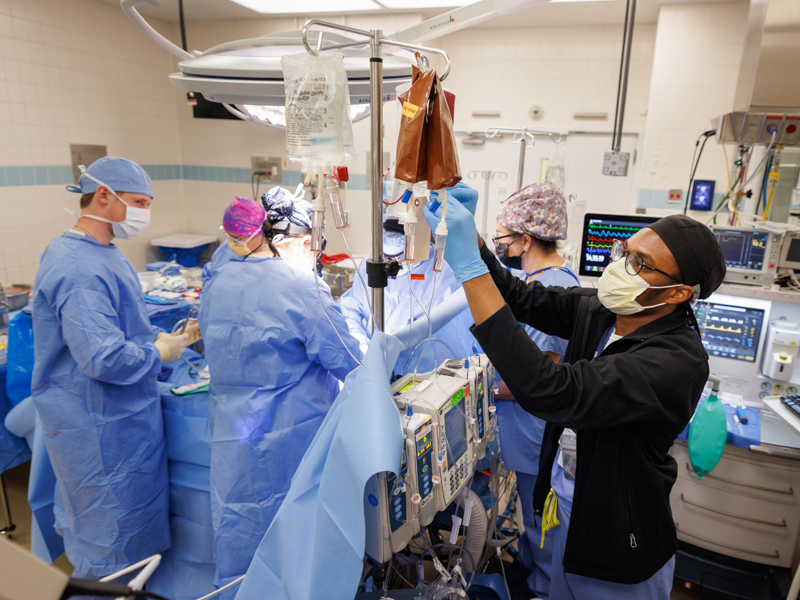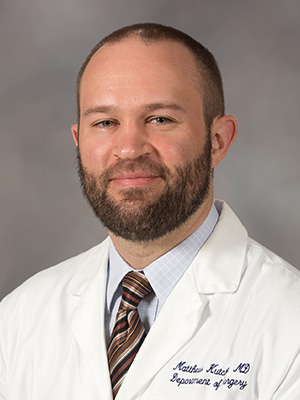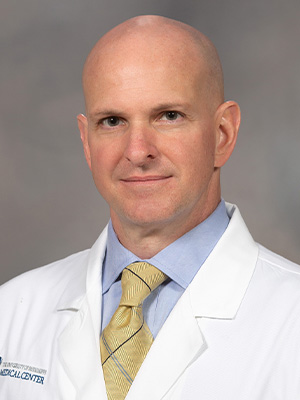April
- Mississippi Center for Clinical and Translational Research Home
- Contact MCCTR
- About Us
- Cores and Programs
- Funding Opportunities
- Training Opportunities
- News and Events
- News Archive
Is whole blood best for severely bleeding trauma victims? Study aims to find out

Dr. Matthew Kutcher remembers treating a patient who was bleeding profusely from internal injuries when she arrived at the University of Mississippi Medical Center.

“Her spleen and part of the blood supply to her intestines had been damaged by the impact” of a car wreck, said Kutcher, an associate professor of surgery who treats critically ill and injured patients in UMMC’s intensive care units. “The EMS crew on the scene immediately called our AirCare helicopter to bring her straight to us as quickly as possible.”
After receiving red blood cells and plasma on the aircraft, the patient was taken quickly to the operating room. Her spleen was removed to control the bleeding. “If it had been more than another few minutes longer, we might not have gotten the bleeding controlled in time to save her,” Kutcher said.
“Standard blood banking procedure is to separate blood into its component parts – red blood cells, plasma and platelets – for storage. That way, the parts can be used individually if a patient needs red cell transfusion for anemia, or plasma to reverse a blood thinner, or platelets to prevent bleeding related to the effects of chemotherapy,” Kutcher said.
“But when people have severe bleeding after an injury, they are losing blood, and not red blood cells, plasma, and platelets separately. So, the best way to transfuse someone who is bleeding is to give them back exactly what they’ve lost.”
Several studies in both military and civilian settings have suggested that using whole blood may be better for patients than trying to reassemble blood from the separate stored components.
That’s the subject of the Type O Whole Blood and Assessment of Age during Prehospital Resuscitation (TOWAR) Trial - TOWAR for short - to be conducted by 10 U.S. trauma centers, including UMMC. The Department of Defense-funded study is buoyed by previous studies that showed giving patients whole blood earlier is potentially better for them.
“What we’re trying to find out is whether using whole blood as early after injury as possible in patients with major bleeding will help more patients survive,” said Kutcher, co-investigator of the UMMC study site.

“Keeping whole blood available at all times to deliver to patients at the point of injury – as well as in remote environments and military settings – is difficult, because it is considered to expire after a certain time,” said Dr. Jason Sperry, a trauma surgeon at the University of Pittsburgh and the study’s principal investigator.
“So, we also want to know more about the shelf life … whether how long the whole blood has been stored makes a difference in how effective it is,” Sperry said.
The whole blood used in the TOWAR study is “low-titer” blood, meaning it contains low levels of antibodies that could trigger transfusion reactions. That allows it to be safely transfused to people, even without knowing their blood type.
Those performing the study, however, might need to forego a traditional step: asking the patient on the front end if they’d like to participate in the trial, and giving them documents to sign and time to make a thoughtful decision.
When a patient is bleeding profusely and their injuries make it impossible for them to give consent, or when their family is absent or can’t immediately be found, life-saving treatment can’t wait.
TOWAR is an “exception from informed consent” trial. Patients transported to UMMC who meet the criteria will be enrolled, and they or their family will be asked as soon as possible if their participation in the trial can continue, or if they’d like to opt out.
UMMC is the state’s sole Level I trauma center and was chosen for the study because of its experience in trauma care, helicopter critical care transport and blood product transfusion protocols and practices. The Medical Center is one of 29 members of the DOD-funded Linking Investigations in Trauma and Emergency Services research network that focuses on blood, breathing and brain research.
Others taking part in the four-year, multimillion-dollar trial are Brooke Army Medical Center in San Antonio, Texas, the University of Texas at San Antonio and at Houston, the University of Tennessee at Knoxville, the University of Louisville, Vanderbilt University, the University of Cincinnati, MetroHealth in Cleveland, Ohio, and the University of Pittsburgh.
It will enroll more than 1,000 adults 18 and over. Patients who qualify for the study will be assigned to one of two groups: one that will receive type O whole blood, or one that will receive the usual standard of care component blood transfusions. More explanation can be found at www.litesnetwork.org/TOWAR.
AirCare transfuses the significant majority of blood and blood products flown by medical air transports in Mississippi. AirCare is the only medical helicopter transport operating in the state, and one of few in the nation, that stocks and administrates prothrombin complex concentrate to reverse anticoagulant drugs in patients with acute major bleeding.

“Bringing the most effective form of blood transfusion to patients as early as possible is critical after severe injury,” said Dr. Kendall McKenzie, professor and chair of UMMC’s Department of Emergency Medicine. “This study may help us understand the best way to do that. Time is of the essence in trauma, and having the capability to provide whole blood transfusions to bleeding patients on the way to the hospital is critical to improving survival.”
Plans call for UMMC to activate the trial this spring. Kutcher and others will begin organizing community meetings and visiting small and large hospitals to get feedback. That’s in addition to a web-based survey and discussing the study with a community advisory board.
UMMC’s hope is that “we’ll be able to definitively say whether early whole blood transfusion can help improve outcomes in injured patients with major bleeding,” said Dr. Larry Martin, chief of the Division of Trauma and Critical Care Surgery.
This research is supported by DOD contract W81XWH-16-D-0024 W81XWH19F0494. Any opinions, findings and conclusions or recommendations expressed in this material are those of the author(s) and do not necessarily reflect the views of the Department of the Army, DOD or the U.S. government.


